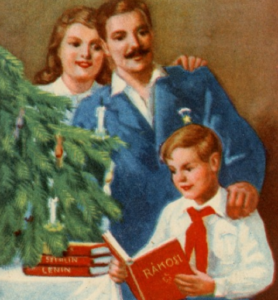After World War II, the Communist governments which the Red Army had imposed on eastern Europe tried to come to terms with Christmas. The Communist state apparatus, with its monopoly of the news media, publishing houses, educational system and the police, attempted to muscle religion out of the winter holiday by moving festivities to New Year, renaming events, making December 25 and 26 work days and replacing any magical gift-bringer who had religious connections (e.g., Saint Nicholas or the Christ Child) with Grandfather Frost. In the German Democratic Republic Christmas angels were renamed “end-of-year winged figures.” There were even attempts to divert the holiday to Joseph Stalin’s birthday on December 21. In Hungary the festival was called the “Feast of Father Winter” or “Feast of the Fir Tree”; December 26, St. Stephen’s Day, a traditional part of the Christmas season, became “Constitution Day.” In Czechoslovakia 1952 President Antonín Zapotcky told children that the traditional gift-bringer Jezisek (baby Jesus) had grown up and turned into Deda Mráz (Grandfather Frost). In Yugoslavia, translators of foreign books removed references to Christmas and changed them to New Year or omitted them altogether. The Christmas carol scene in The Wind in the Willows, for example, was excised but references to the pagan god Pan were left in.
The lameness and artificiality of these efforts can be seen in this 1952 New York Times quote from the Czech Communist newspaper Rude Pravo:
Dado Moros (Russian term for Little Father Frost) will arrive in Prague Dec. 1. He brings young Czech Communists a message of greeting from the Soviet young pioneers and will tell Prague children about the happy life of young builders of communism in the Soviet Union. That’s why adults as well as children await his arrival with great excitement and joy.
